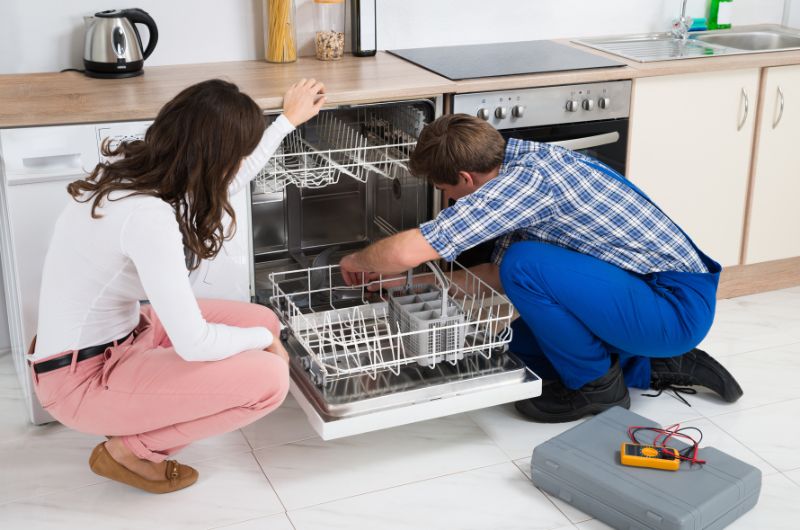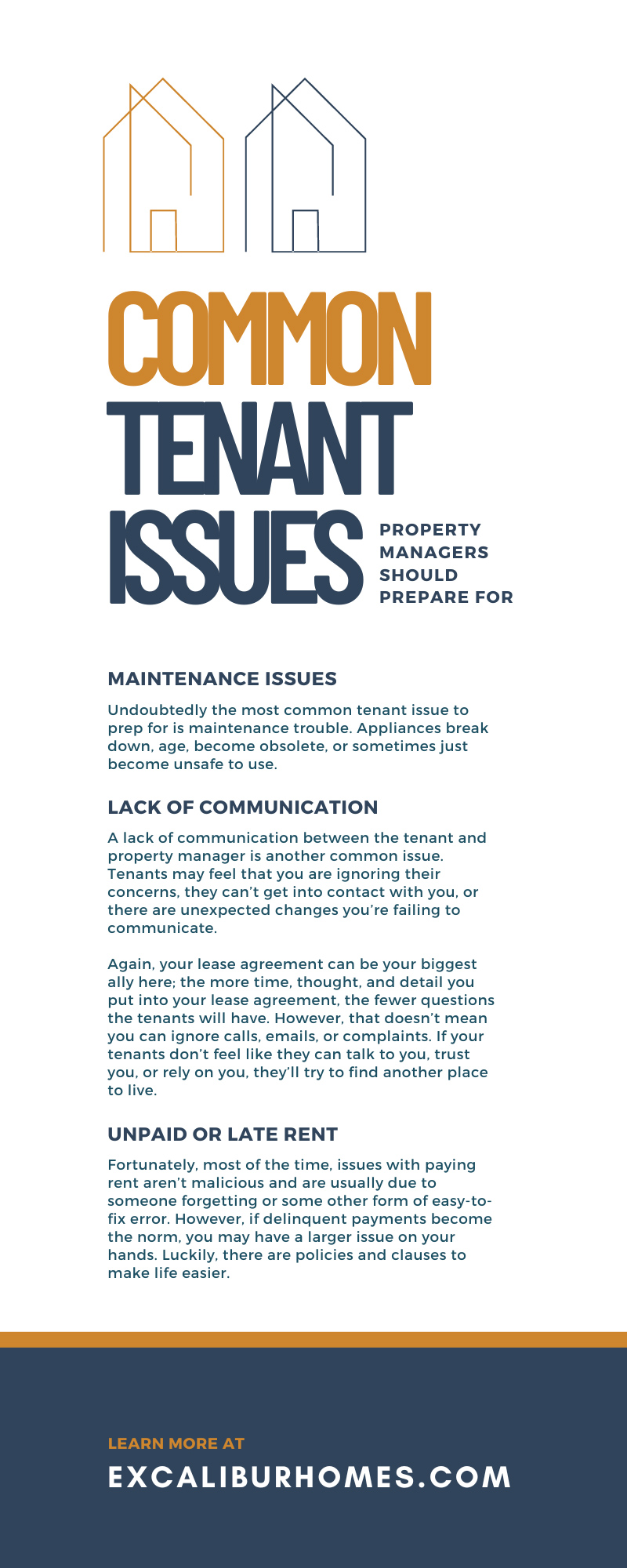
With how much thought and effort goes into managing property, it can feel overwhelming, especially when you’re dealing with people. That’s why it’s so critical for property managers of all kinds to prepare for the worst. Being ready ensures you tackle any situation and roll with the punches as they come. But what exactly should you prepare for?
While there’s no way to think of every single problem that you’ll ever run into, there are a few general problems you can get the jump on. Read on to review some of the most common tenant issues property managers should prepare for.
Maintenance Issues
Undoubtedly the most common tenant issue to prep for is maintenance trouble. Appliances break down, age, become obsolete, or sometimes just become unsafe to use. And as the manager of that property, your job is to provide safe and adequate living conditions for your tenant. You’ll inevitably have to deal with maintenance issues, but how can you make dealing with these issues easier for everyone involved?
Maintenance & Your Lease Agreement
Your first line of defense for almost every issue you’ll face as a property manager is the lease agreement. The lease agreement should unquestionably have a maintenance clause of some kind, covering topics like who’s responsible for certain payments and when maintenance issues you can address. This clearly communicates what your expectations are from your tenants and provides you both with a written document of the terms of the lease.
For example, you can include the fact that tenants must pay for forms of damage they cause. But if utilities or amenities break down naturally, it is up to the property owner to pay for maintenance. It’s always wise to do a walk-through inspection so that both you and the tenant can track any damages. On move-in day, you can walk through the house with the tenant and have them sign an agreement that states a shared understanding of the state of the property and its utilities.
Maintenance Submission Forms
It’s also prudent to have a list of when you expect to address maintenance issues and have a maintenance submission form. A maintenance submission form should require a tenant to state what the issue is, when it started, and how it impacts their quality of life. They should also include their signature. This way, you have a written record of all submitted issues.
Your lease agreement or maintenance submission form should also include a priority system stating what is and isn’t considered an emergency maintenance issue. For instance, cosmetic issues are low-priority requests. Meanwhile, leaky pipes constitute a high-priority request, and an emergency issue would be the loss of power. Each issue should come with an approximation of how long handling these issues should take. Remember, your job is to provide safe housing, so you should handle any issue that makes a unit difficult to live in promptly to avoid litigation.
Lack of Communication
A lack of communication between the tenant and property manager is another common issue. Tenants may feel that you are ignoring their concerns, they can’t get into contact with you, or there are unexpected changes you’re failing to communicate.
Again, your lease agreement can be your biggest ally here; the more time, thought, and detail you put into your lease agreement, the fewer questions the tenants will have. However, that doesn’t mean you can ignore calls, emails, or complaints. If your tenants don’t feel like they can talk to you, trust you, or rely on you, they’ll try to find another place to live.
Like any relationship, even professional ones, communication is incredibly important. An open line of communication can make a world of difference and make unintended disputes due to miscommunication a thing of the past. For example, if you need to increase rent due to changes in the market, slow increases aren’t enough. Rent increase notices should be thorough, including how much it will increase, why, and the laws that allow you to do so. You should give this notice long before you intend to start increasing rent so that tenants that cannot pay have the time to move out.
Sometimes, however, the complaints due to lack of communication aren’t as large as rent disputes. Often, it’s simple things like informing tenants when you’ll be out of contact for vacation, stating your working hours, or informing them of renovations. While some of these may seem small, they can make a tenant feel uninformed and uncared for, making them more likely to complain or leave. In this current age of the internet, a few bad reviews can do serious damage to any business.
Unpaid or Late Rent
Fortunately, most of the time, issues with paying rent aren’t malicious and are usually due to someone forgetting or some other form of easy-to-fix error. For example, if you have tenants pay you through an app, technical issues can occur. Also, if a tenant has just moved in, it can be easy to forget what day rent is due. In that case, a simple reminder should do the trick. However, if delinquent payments become the norm, you may have a larger issue on your hands. Luckily, there are policies and clauses to make life easier.
First, you’ll want to consider including a clause about grace periods in your lease agreement. Grace periods are the time between the rental deadline and the subsequent late fee. Grace periods are usually between three to five days. Because you’re dealing with people, issues with money can arise, and a grace period can help a tenant who’s late due to their employer submitting a late check. But if the tenant still doesn’t pay rent on time, you’ll have to implement a late fee.
Before including a late fee in your lease agreement, you need to check with state and local laws, as some areas will cap late fees. The typical late fee amount is about 5 percent of the overall monthly rent price. However, federal law states the following:
- You cannot add interest to late fees
- You cannot take the late fee out of a later rent payment
- You cannot evict a tenant for not paying this fee
However, what you can do is take the late fee out of the tenant’s security deposit and give them a written notice. Include that you will do so in the lease agreement to avoid future complaints.
While there will always be situations you can’t predict, these are the top three most common tenant issues property managers need to prepare for. But if you’re struggling with all the hats you need to wear as a property manager, Excalibur Homes is here to help. We’re a real estate property management company in Nashville, Tennessee, with experienced employees who can help you tackle and manage the tenant issues you may face.




